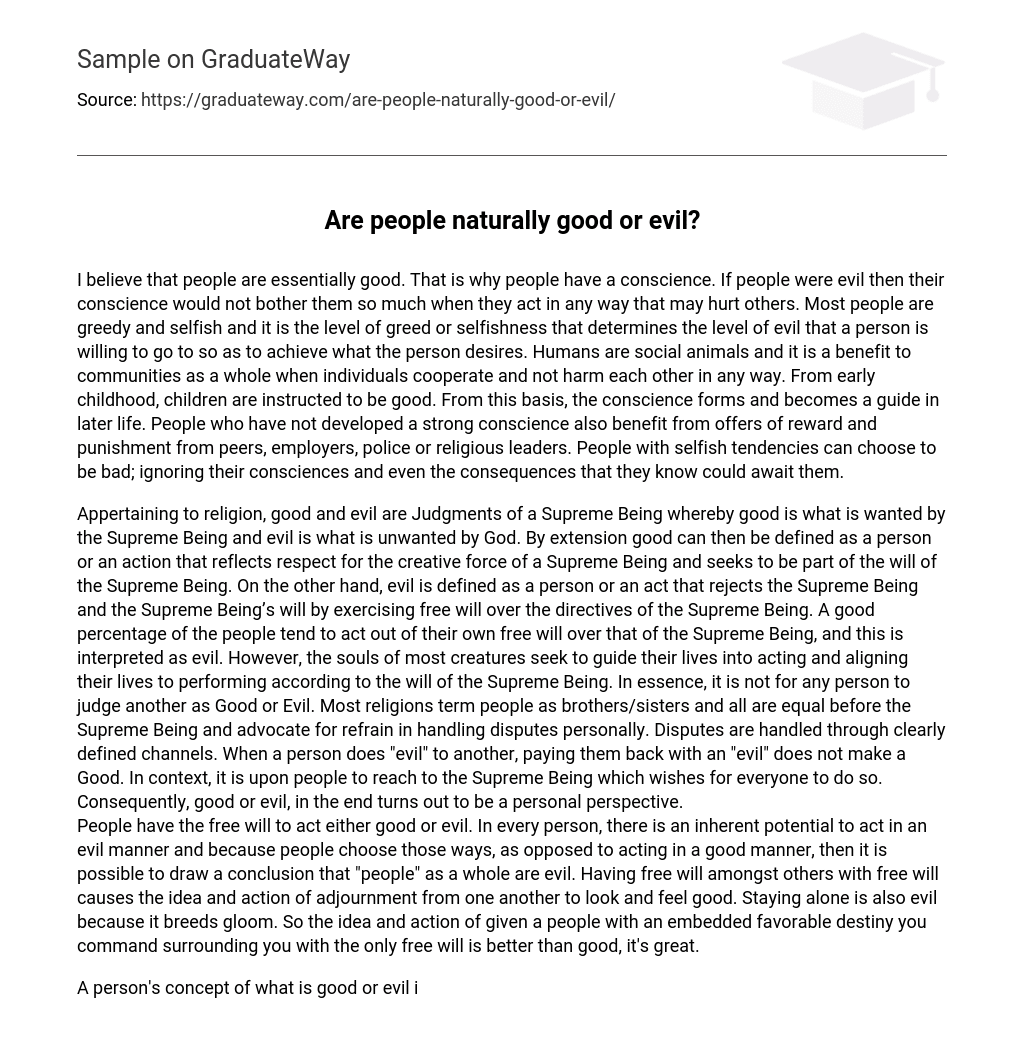I believe that people are essentially good. That is why people have a conscience. If people were evil then their conscience would not bother them so much when they act in any way that may hurt others. Most people are greedy and selfish and it is the level of greed or selfishness that determines the level of evil that a person is willing to go to so as to achieve what the person desires. Humans are social animals and it is a benefit to communities as a whole when individuals cooperate and not harm each other in any way. From early childhood, children are instructed to be good. From this basis, the conscience forms and becomes a guide in later life. People who have not developed a strong conscience also benefit from offers of reward and punishment from peers, employers, police or religious leaders. People with selfish tendencies can choose to be bad; ignoring their consciences and even the consequences that they know could await them.
Appertaining to religion, good and evil are Judgments of a Supreme Being whereby good is what is wanted by the Supreme Being and evil is what is unwanted by God. By extension good can then be defined as a person or an action that reflects respect for the creative force of a Supreme Being and seeks to be part of the will of the Supreme Being. On the other hand, evil is defined as a person or an act that rejects the Supreme Being and the Supreme Being’s will by exercising free will over the directives of the Supreme Being. A good percentage of the people tend to act out of their own free will over that of the Supreme Being, and this is interpreted as evil. However, the souls of most creatures seek to guide their lives into acting and aligning their lives to performing according to the will of the Supreme Being. In essence, it is not for any person to judge another as Good or Evil. Most religions term people as brothers/sisters and all are equal before the Supreme Being and advocate for refrain in handling disputes personally. Disputes are handled through clearly defined channels. When a person does “evil” to another, paying them back with an “evil” does not make a Good. In context, it is upon people to reach to the Supreme Being which wishes for everyone to do so. Consequently, good or evil, in the end turns out to be a personal perspective.
People have the free will to act either good or evil. In every person, there is an inherent potential to act in an evil manner and because people choose those ways, as opposed to acting in a good manner, then it is possible to draw a conclusion that “people” as a whole are evil. Having free will amongst others with free will causes the idea and action of adjournment from one another to look and feel good. Staying alone is also evil because it breeds gloom. So the idea and action of given a people with an embedded favorable destiny you command surrounding you with the only free will is better than good, it’s great.
A person’s concept of what is good or evil is based on their background. Different people act differently because of their past experiences. Whether a person develops with good or evil tendencies depends on both internal and external factors. In this context, external factors include the environment and parents’ upbringing methods as they raised their child. The existence of law, strict rules and good enforcement does not necessarily stop the occurrence of crime. Law and rules exist to reduce crime and bring crime to manageable levels. The reason for this is because there is always good and evil living side by side in this world. A person born with good traits and tendencies attribute them to the parents, family, neighborhood, etc and recognize these factors as the building blocks to a becoming a good or bad person in the future. External factor are a big influence though it is the internal factors at the end that determine that person’s choice.
Dictators such as Hitler and Milosevic perhaps two of the worst perpetrators of genocide and crimes against humanity in the last century were adult survivors of childhood abuse and they carried out their official functions with great influences from their childhood experiences exhibiting utter lack of respect for human life. In the bible, the Pharisees believed that they were doing the right thing in sentencing Jesus Christ to death and they led many people to believe that the Pharisees were doing the right thing. Closer home, in the 1920s, many Americans had grown to accept the alcohol wealth society which practiced rampant bootlegging which was contrary to the law of the time. The above concept brings the question of trying to demarcate the border between the law and what is morally right. Civilizations enact laws, but these laws are only conveniences similar to the terms of a truce.
Basically, if there is no fundamental law, then there is no transgression, and hence no evil. So without a fundamental law, there can be no “evil age” as predicted in many religions. In order for humans to believe anything, assumptions have to be made. The most basic assumption is that the things we have seen in the past are a good representation of the truth. In light of this assumption, many things fall into place. An example is that if a person tells another that there has been an earthquake, most probably the second person will believe because from experience that is the reasonable thing to do. From experience, people build up concepts of what things are possible, and what things are not. Most of science and commerce is based on past observations. Variances of opinions arise when interpretations and probabilities are carried out.





